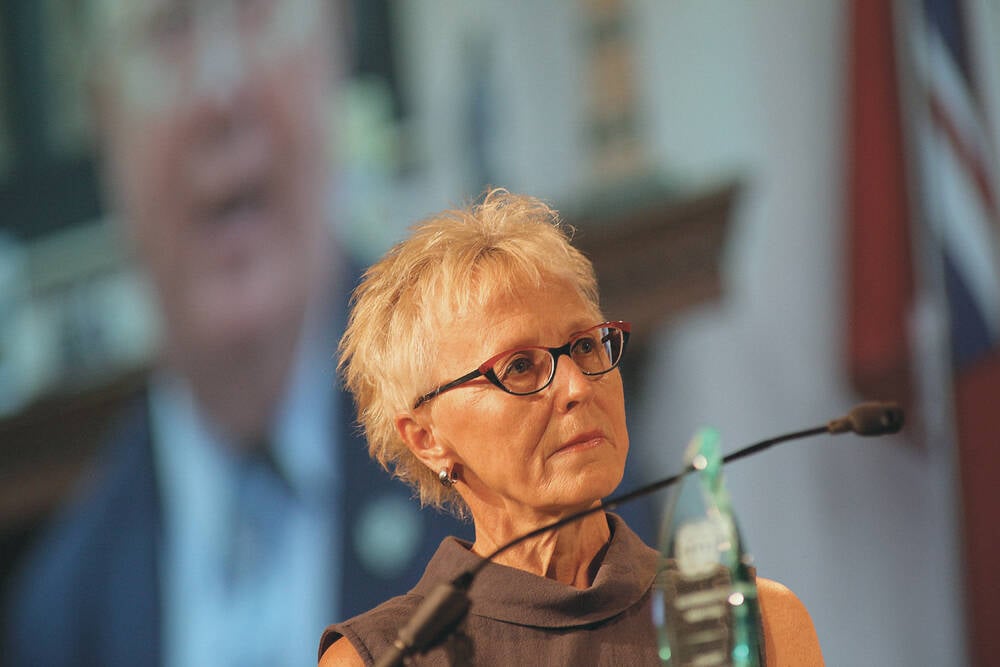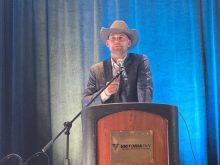Dori Gingera-Beauchemin worked hard for over 44 years as a member of Manitoba Agriculture, including a long stint as the province’s deputy agriculture minister.
Now, two and a half years after retiring from her role, her decades of work have landed her a spot in the Canadian Agricultural Hall of Fame.
“It’s just a thrill. Just unbelievable,” she said. “I think, ‘I’m going to wake up and this didn’t really happen,’ but again, the honour … I just hope to keep being involved because agriculture is the best industry to work in. Absolutely the best.”
Read Also

Trade uncertainty, tariffs weigh on Canadian beef sector as market access shifts
Manitoba’s beef cattle producers heard more about the growing uncertainty they face as U.S. tariffs, and shifting trade opportunities, reshape their market.
WHY IT MATTERS: Gingera-Beauchemin is one of six names that will be inducted in the Canadian Agricultural Hall of Fame during a ceremony Nov. 8, in Victoria, B.C.
Gingera-Beauchemin was born on a farm north of Dauphin. She was an active 4-H member for many years. She studied agriculture at the University of Manitoba and then went on to work for the provincial agriculture department.
“I worked for the department three summers during high school when we lived in McCreary, so I got familiar with the department then,”she said.
Throughout university, all her jobs were with the provincial agriculture department.
“It was knowing the department and the kind of people that it had attracted that were mentors and people I looked up to,” she said of her early employment. “I thought it would be a good place for what I thought would be part of my career. Little did I know, I’d stay the whole time.”
Her first government role was as a 4-H specialist in Beausejour and Steinbach. At that time, the position was equivalent to a 4-H provincial lead. Following that, she moved to Portage La Prairie, where she served as the director of central Manitoba for the department, covering 10 agricultural regions.
She later moved to Winnipeg to become the director of marketing and farm business management.
She held a series of other agriculture-related government positions — including assistant deputy minister, roles in agri-food and rural development and policy and agri-environment — before becoming deputy minister of agriculture in 2013.
By the time she retired, she had served as deputy minister across four different agriculture ministers and through both NDP and Progressive Conservative governments.
Today, she farms soybeans, canola, wheat, oats and flax with her husband just outside Winnipeg.
Her nomination for the national hall of fame, made by consulting firm Emerging Ag Inc., noted her continued ag advocacy after retirement.
Rural perspective, farm priorities
Gingera-Beauchemin is interested in many aspects of agriculture, especially sustainability.
“Sustainability of the environment, which I mean is sort of an obvious one, but also of our industry and our rural social fabric,” she said. “All those pieces are important. I came from a farm, then a very small town and I believe in rural. I believe in small towns. I’m a bit like Paul Brandt; small towns, big dreams.”
Gingera-Beauchemin had a hand in the creation of Manitoba’s Sustainable Protein Strategy; one of her proudest achievements.

Manitoba is the first province to have a sustainable protein strategy. It covers growth for both plant and animal protein, she noted, adding both are given equal weight.
“We know our economy depends on both animal and plant protein, which are important to us,” she said.
Gingera-Beauchemin pointed to key industries like the pork sector.
In 2004, Winnipeg hosted the World Meat Congress. It was the first time the conference was held in Canada. The conference was not limited to to the pork sector, “But it (the pork industry) was one of the reasons why we were able to secure that event,” she said. “To me, it was part and parcel of putting a spotlight on what’s possible, what’s happened, and what is happening and is possible.”
Despite the work put into developing the strategy, the bigger challenge came afterward, she said. That’s the point when the plan on paper meets the real world, “helping the minister take those ideas to cabinet and try it on for industry.”
“Then for myself, it’s really (about) going up to the federal level, where there are partnerships and alliances, and policy development that can help form this sustainable protein industry,” she said.
The end result was “targeted to drive expanded economic activity around protein, making those things available for our industry to succeed,” she said.
Farm community
Gingera-Beauchemin is passionate about agricultural organizations, particularly 4-H.
Manitoba was the first province in Canada to run 4-H, and it is well established with farm and rural communities in the province.
“To me, it’s been extremely important,” she said, adding she sees high value in other agricultural organizations like Agriculture in the Classroom and the province’s many community ag societies.
“These programs hit more on the social and human side rather than the technical side. And to me, it’s all a piece of that sustainable rural economy and community,” she said.
Gingera-Beauchemin was instrumental in setting up a 4-H exchange program with Japan that persists to this day. The program is a collaboration with a foundation set up by the York-Beminaru Company, a large supermarket company in Japan.
The York-Beminaru Company was already doing business with the province of Manitoba, purchasing Manitoba honey and pork for their supermarkets. When marketing staff in Manitoba’s agriculture department heard the company was supporting a youth exchange program with California, they pushed for a similar Japanese exchange with Manitoba.
That program began in 1987 and has had about 1,000 students participate.
Every year, a group of about 20 Japanese students comes to Manitoba. On alternating years, Manitoba students go to Japan. Each exchange last two weeks and is completely paid for by the company-affiliated foundation.
Gingera-Beauchemin said long-time friendships have blossomed between the two nations because of the program. Some exchange students have later returned to their host country for events like vacations or weddings.
“No one thought it would last this long or run this well,” she said.
The program has has periodic pauses due to international incidents such as SARS, 9/11, and COVID-19. But after each global event, the program has picked up and kept on going.
In 2018, Gingera-Beauchemin received a commendation from the Japanese foreign affairs minister for setting up the program.
Bound for the hall of fame
Robynne Anderson, president of Emerging Ag Inc. was part of the group that put together Gingera-Beauchemin’s nomination and has known the hall of fame honouree for decades. Others who worked on the nomination include former agriculture minister Ralph Eichler and Dean Fraser, who used to work at MacDon, a global farm equipment company based in Winnipeg.
Anderson and Gingera-Beauchemin both serve on the board of Farmers Abroad Canada, a non-profit that supports agriculture education internationally in places like Zambia and Ghana. Anderson is chair of the organization and was involved with its founding.
She said Gingera-Beauchemin can easily see possible ways to build a community and work together.
“One of the hallmarks of her nomination process is we had former ministers of agriculture from both parties endorse her nomination, which I think is quite special and isn’t very common anymore,” said Anderson.
“It’s definitely proof of what a tremendous consensus builder she is and how she has the interest of the sector of a whole at heart.”
Anderson said Gingera-Beauchemin is passionate about the industry and has a strong sense of community.
“She has a can-do attitude. While working in government, she’s always been able to see the path forward to advance issues.”
Anderson noted Gingera-Beauchemin’s huge commitment to 4-H, her commitment to youth and the abilities she brings to Farmers Abroad Canada.
Anderson added that Gingera-Beauchemin has the unique ability to see agriculture as a whole, saying that “she understands the role of livestock and crops value add across our agriculture sector in a very holistic way.”
Gingera-Beauchemin said her time in the agriculture industry in Manitoba has been a healthy work environment, especially with partners and colleagues in the department.
“I couldn’t have picked a better job or a better industry to be in,” she said.
Since she retired in 2023, Gingera-Beauchemin has been sitting on several boards. She currently sits on the board of Protein Industry Canada, the Canadian Agriculture Policy Institute, Farmers Abroad Canada and Protein Manitoba.
“I am lucky that I am able to stay in my lane and be able to keep up or learn or listen or meet people that are growing in depth and capacity and doing amazing things,” she said.
















